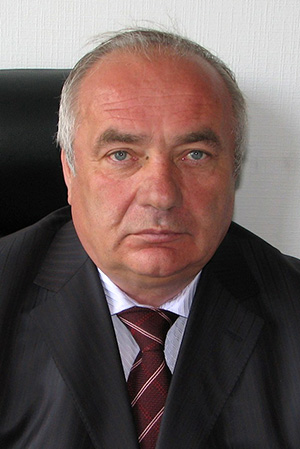|
UDC 338.43:352/354:005; JEL B41, O18, Q12, R38
Butko, M. P., Kolosha, V. P., & Rasskazov, O. I. (2020). Metodolohichni pidkhody do otsinyuvannya vplyvu ahropromyslovykh pidpryyemstv na rozvytok terytorial'nykh hromad [Methodological approaches to assessing the impact of agro-industrial enterprises on the development of territorial communities]. Rehional'na ekonomika - Regional Economy, 97 (3), 14-22. DOI: https://doi.org/10.36818/1562-0905-2020-3-2. [in Ukrainian].
Sources: 6
Authors
Butko Mykola PetrovychDoctor of Economics, Professor, Honored Economist of Ukraine
Professor of the Department of management and administration of the Academic Institute of Management, Food Technologies and Trade of the Chernihiv National University of Technology
Contacts:  butko.mykola@ukr.net butko.mykola@ukr.net
Webpages:      

Kolosha Valeriy PetrovychDirector of PJV «Piskivske» in Chernihiv region
Contacts:  kolosha.v.p@ukr.net kolosha.v.p@ukr.net
Webpages:  
Rasskazov Oleh IhorovychPostgraduate of the Department of management and administration of the Academic Institute of Management, Food Technologies and Trade of the Chernihiv National University of Technology
Contacts:  oleh.passkazov@ukr.net oleh.passkazov@ukr.net
Webpages: 
ResumeThe agro-industrial complex of Ukraine is one of the most relevant segments of the national economy, which provides an adequate level of food security of the regions and the state as a whole, as well as forms a significant amount of domestic expert material. However, institutional miscalculations of the state, underestimation of the peculiarities of the formation and functioning of domestic and foreign food markets, as well as ignoring the role of local governments and civil society institutions in rural development, led to agricultural enrichment, dominance of small-scale production, lack of motivation for integrated development formations, and depopulation of rural areas. The essence of modern EU agricultural policy in the third millennium and the need for our country to join it are studied. Methodological approaches to assessing the impact of agro-industrial enterprises on the integrated development of territorial communities in the context of decentralization of power are developed. The multifaceted nature of the process of functioning of agro-industrial production in the direction of ensuring the development of communities determines the influence of a significant number of factors. Generalizing scientific approaches in this area, all factors can be combined into several aggregate groups: production, consumption, social, institutional, and environmental orientation. The proposed methodological approaches to assessing such impact, in addition, provide an opportunity to develop areas for long-term mutually beneficial development of the entities in this system. The purpose of such promising parameters should be to develop mechanisms to ensure the production of high-quality food products, primarily for domestic consumption; to improve the level and quality of life of rural residents; to improve the system of management of territorial communities and formation of effective schemes of their interaction with business entities; to stimulate the activity of the population of the territories as a locomotive of these processes; to ensure the improvement of the ecological condition of settlements and environmental protection.
Keywords:agro-industrial enterprise, balance and complexity of development of territorial communities, barriers of development of agro-industrial production, regularities, factors, principles of development, paradigmatic positions, axiological approaches
References- Bystryakov, I. K. (2013). Prostorovi aspekty staloho rozvytku: postneklasychnyy dyskurs [Spatial aspects of sustainable development: post-classical discourse]. Ekonomichna teoriya – Economic theory, 2, 5-15. [in Ukrainian].
- Borodina, O. M. (2016). SAP YeS yak dynamichne spoluchennya haluzevykh potreb i suspil’nykh interesiv [EU CAP as a dynamic combination of sectoral needs and public interests]. Ekonomika Ukrayiny – Economy of Ukraine, 11, 58-70. [in Ukrainian].
- Butko, M. P. (2017). Bifurkatsiynyy stan derzhavotvorchoho yadra Ukrayiny v umovakh realizatsiyi yevrointehratsiynoho kursu [Bifurcation state of the state-building core of Ukraine in the conditions of realization of the European integration course]. Ekonomika Ukrainy – Economy of Ukraine, 10, 60-61. [in Ukrainian].
- Bortis, H. (2007). Instytutsiyi, povedinka ta ekonomichna teoriya. Vnesok do klasyko-keynsians’koyi politychnoyi ekonomiyi [Institutions, behaviour and economic theory. A contribution to classical-keynesian political economy]. Kyiv: Kyiv-Mohyla Academy. DOI: https://doi.org/10.1017/cbo9780511582349 [in Ukrainian].
- Kazmir, L. P. (2019). Suchasni paradyhmy rozvytku rehional’nykh ahroprodovol’chykh system [Modern paradigms of development of regional agri-food systems]. Rehional’na ekonomika – Regional economy, 4, 94-103. [in Ukrainian].
- Butko, M. P. (2016). Arkhitektonika konkurentospromozhnosti rehioniv Ukrayiny v konteksti yevrointehratsiyi [Architectonics of competitiveness of regions of Ukraine in the context of European integration]. Kyiv: Academy of Municipal Administration. [in Ukrainian].
|